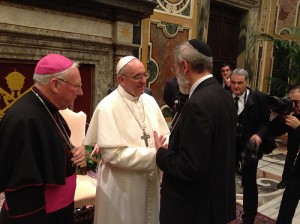DIALOGUE – The Italian Rabbis and Francis
 By Adam Smulevich and Daniel Reichel
By Adam Smulevich and Daniel Reichel
What do Italian Rabbis think about Jorge Bergoglio? What is the impact of his actions on interfaith dialogue?
Pagine Ebraiche, the magazine of Italian Jewry asked some prominent Italian Rabbis a few questions in order to understand how a Pope who has been defined as revolutionary by many is viewed by the nearby Jewish Community.
“Jorge Bergoglio has shown great willingness to talk, and has made and many meaningful gestures” says Riccardo Di Segni, Chief Rabbi of Rome. “From the point of view of interfaith dialogue, the friendly atmosphere he has created is a good start”.
The acquaintance between Rabbi Di Segni and Jorge Bergoglio started right after his election. Rabbi Di Segni attended his inauguration. A few days later, on Pesach Eve, Francis sent him a letter wishing him and Rome’s Jewish Community a happy Passover.
“May the Almighty, who freed his people from slavery in Egypt to guide them to the Promised Land, continue to free you from every evil and accompany you with his blessing” read the Pope’s note, adding “I ask you to pray for me, while I assure you of my prayers for you, trusting that we can deepen the bonds of esteem and mutual respect”.
In the past year, the two have met on several occasions. Among the many important messages sent by Bergoglio, Rabbi Di Segni underlines how he acknowledged the role of Jewish people as witnesses of faith throughout human history, and how they inspired the entire Christian world.
“These words represented a significant step forward in the relationship between Jews and Christians. There are still many issues which lay ahead us, but my feeling is that the premises
are good” the Rabbi explains.
According to Rabbi Di Segni, the Jewish world should also reflect upon the “Bergoglio effect” in the perspective of the relationship between religious leaders and their public.
“The formal willingness of the pope to emphasize some aspects of Christian faith, such as Love and Forgiveness, over doctrine, is interesting” the Chief Rabbi of Rome notes.
“His choice is directed towards overturning the previous austere image of the Church, attracting many who had felt pushed away before. Also in our Communities we can find people who feel uneasy when confronted with Halakhah (i.e. Jewish Law). We must understand and acknowledge this feeling. However, someone expecting from a Rabbi something similar to what we see from the Pope would be wrong. There are deep differences in the way Jews and Christians live their faith, though many people do not seem to be aware of it”.
The Chief Rabbi of Milan Alfonso Arbib is also impressed with the new pope.
“Bergoglio has remarkable communication skills, uses simple and direct words, and is driven by good ideas” says Rabbi Arbib.
As far as Jewish-Catholic dialogue is concerned, Milan’s Chief Rabbi underlines the importance of affirming the idea that Jewish Messianic expectation is not in vain, that Substitution Theology (which is based on the idea that Christians replaced Jews as the Chosen People) is to be overcome and that coexistence without expectations of conversion is possible.
“They are all positive steps along the path first drawn by the Second Vatican Council in the Sixties” says Rabbi Arbib.
Rabbi Elia Richetti, emeritus President of the Italian Rabbinical Assembly, is ready to acknowledge just how much Bergoglio’s magisterium represents something new within the Church “not so much from the point of view of doctrine, but in the day-to-day behavior of the Roman Curia which is changing very quickly”.
“I believe this could have a deep impact on interfaith dialogue and I am extremely interested to see what will happen” says Rabbi Richetti.
However, Rabbi Richetti stresses that many issues are still to be discussed. “We must remember that Bergoglio has close ties with non-Orthodox Jewish leaders whose opinions and actions are not necessarily relevant to the Orthodox world”.
Rabbi Roberto Della Rocca, director of the Department of Education and Culture of the Union of Italian Jewish Communities, uses the story of the great ancient sages, Hillel and Shammai, to underline the importance of greeting people with a smile, a feature that undoubtedly applies to Bergoglio.
“Shammai, who was considered a stricter and sterner man than Hillel, still recommended that everyone be welcomed with a happy face” recalls Rabbi Della Rocca. “Affability and friendliness are very important to human relationships, especially in a time when people find themselves surrounded by a moral and human void, and crave for warm-heartedness”.
“Joseph Ratzinger represented great moral and intellectual rigor, by selecting Bergoglio as the new pope, the Church has decided to rely on a pastoral figure” notes the Rabbi.
On interfaith dialogue, Rabbi Della Rocca stresses the importance of overcoming the concept that minority cultures have to adapt to the majority or stay subordinate to it.
“On the contrary, the challenge must be to explore and appreciate the differences”.
“My impression is that after Bergoglio’s election, new challenges are knocking at our door. I am especially referring to Francis’ full social agenda, and to the opportunity of starting common initiatives to heal the suffering of the entire human kind” says the Chief Rabbi of Florence Rabbi Joseph Levi, who invites Jewish leaders to take up the challenge with a proactive approach.
“My hope is that a growing number of people professing both faiths will be willing to help pursue this goal. Together we can achieve great things”.
